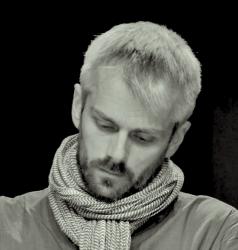And the counter-attack of ignorant authorities, Hafsteinn Gunnarsson, director of París Norðursins, interviewed
Hafsteinn Gunnar Sigurðsson’s second feature film, ‘París Norðursins’, or ‘Paris of the North’, revolves around a 37-year-old man, disoriented, as it seems, after a breakup, and his relations to various people, not least of all his chaos-factory of a father. While the son fled his hardships into a small town on the countryside, the father seems to have fled all over the place—last stop: Thailand.
The father comes for a visit just at the start of the son’s summer vacation, boozes, and flirts with a woman the son had intermittently been involved with.
The male animal
The film touches on various themes. It is a comedy of sorts, but a quiet, subtle one. I asked the director about its relations to earlier Icelandic comedies, many of which have focused on disoriented male figures. Hafsteinn replied:
“You mention Þór and Danni from the ‘Líf’-series. That’s not out of the blue in relation to ‘Either Way’ [his first feature, 2011]. That one happens in the 80s, of course, and is in many ways an ode to that period’s filmmaking, the films I grew up with. ‘Paris of the North’ continues examining manhood and relations between men, but in a different and perhaps a bit more dramatic mode than ‘Either Way’. ‘Paris of the North’ focuses on the relation between father and son and various sides of fatherhood. Certainly these characters are confused and flawed, which may be archetypal for how unsetttled the male animal seems to be after the changes gender roles have undergone in previous decades. Hopefully my films are a bit more realist than some of the comedies you mentioned.”
The film is to some extent a coming-of-age story. It also seems to have symbolic side to it, such as the near-literal castration of the father. Do you think of it as a parable?
“No, I don’t. It certainly is a story of growth of both father and son, who to some extent reject maturity. But towards the end you can glimpse some hope that they might advance a bit.”
Untold stories
Your films seem to belong among a few other recent works, in advancing a new realism. Baldvin Z, even Benedikt Erlingsson, come to mind, although the subtle sense of humor you share with Benedikt makes it tempting to speak of realist comedies rather than realism pure and simple. Do you see yourself as member of a generation of filmmakers meeting new challenges? Or is your journey purely one man’s affair?
“I absolutely sense a new generation of filmmakers, male and female, entering the scene. Perhaps the works of these people strike a more realist note than what came before. It will be exciting to observe what happens in Icelandic filmmaking in the years ahead. So many stories remain untold, so many formal experiments are yet to be made. A certain wave has started. Currently, local cinemas are screening seven Icelandic films, which is a record. This can be related to the last government’s decision to support the creative field and boost the Icelandic Film Fund. The current government has cancelled those investment plans and cut the Film Fund’s budget severely. The effects are already felt. To advance further still, Icelandic cinema needs investment. In that sense my generation is, sadly, fighting similar challenges as earlier ones: ignorant authorities.”
Hafsteinn mentions that the first all-Icelandic feature film was made in 1977 and the Film Fund was only established the following year. “It’s so young. And perhaps only now, this field is finding out what it is and where it wants to go. Now, a lot of knowledge and skill has been amassed, both technical and in terms of ideas, and the field is realizing its potential. It would be disastrous if the only thing lacking turns out to be the political decision to seriously invest in the field.”
NOW WITH SUBTITLES! Special Airwaves ´hangover screening at noon, Saturday November 8: WOW: the first two who bring a copy of this article to Bíó Paradís get in for free (+1)
Buy subscriptions, t-shirts and more from our shop right here!


















